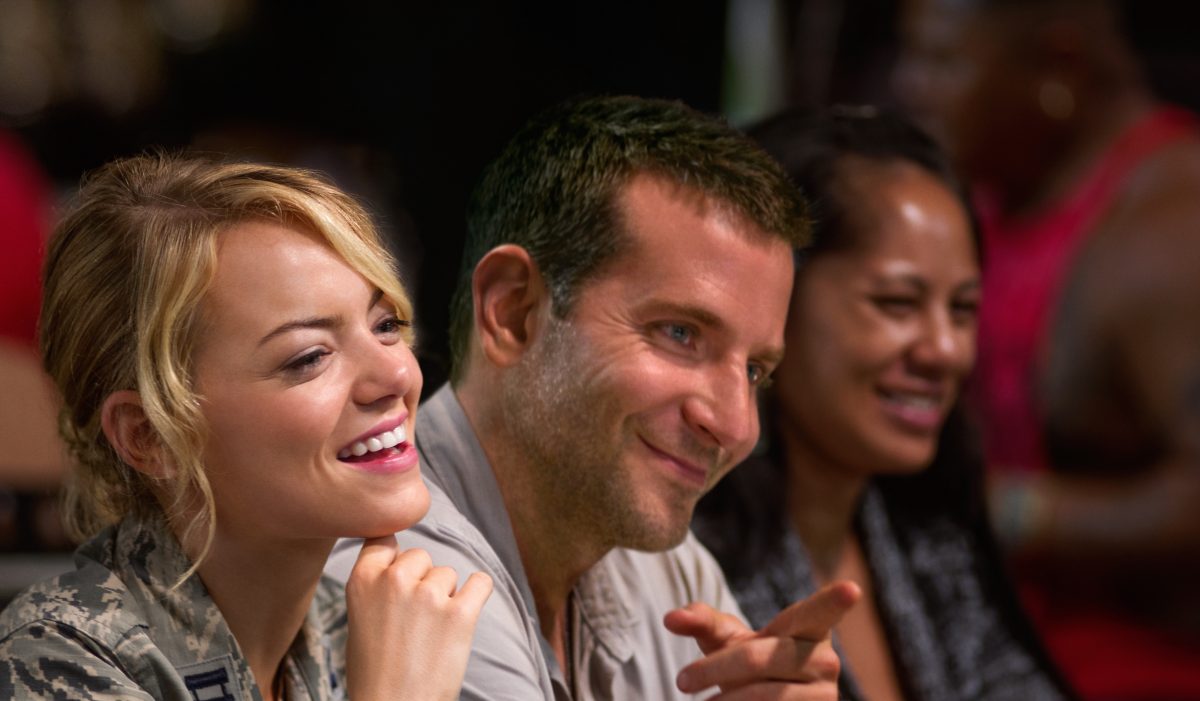
I experienced something akin to cognitive dissonance as I watched Cameron Crowe’s Aloha. I’ve loved many of Crowe’s past films—from Fast Times at Ridgemont High (which he only wrote) to Say Anything to Almost Famous—and I love this particular kind of film, that deals with people and relationships and human behavior. But here’s the thing: Half the time while watching Aloha, I had no clue what was going on. Not so much the plot—although I was admittedly a bit muddled on that, too—but why anyone acted the way they did. Indeed, sometimes characters would say one thing and their behavior indicated the exact opposite. It almost felt like the film was trolling me.
Take our hero, military contractor Brian Gilchrest (Bradley Cooper) who is twice described as “looking terrible” even though he looks great—I mean, he looks like freaking Bradley Cooper. He has a limp (about as inconsistent as his character) that he acquired while in active duty as a fighter pilot in Afghanistan. Once a dreamer who looked skyward and saw nothing but possibility, he somehow lost his moral compass in Afghanistan and now does the bidding for a billionaire mogul (Bill Murray) who claims he wants to invest in space technology but might have a more nefarious agenda. Tasked with getting the local approval to launch a rocket on Hawaiian sacred ground, Gilchrest returns to the Air Force base in Honolulu where he cut his teeth, only to encounter a super-eager and officious young captain named Allison Ng (Emma Stone) and his ex-girlfriend Tracy (Rachel McAdams). But who is Brian Gilchrest? He describes himself as a “lone wolf” and insists that he prefers short conversations—five words or fewer. Tracy describes him as incapable of deep feeling or commitment. Ng describes him as a “cynic.” And yet…not really? He seems very willing to discuss his feelings with Tracy, falls for Ng almost right away, and doesn’t seem particularly angry or self-loathing. In fact, he seems like your basic Bradley Cooper cool guy, not a speck of anger or depth to be found.
And what to make of John Krasinski’s Woody, who is Tracy’s husband, a fighter pilot who is so non communicative that he’s nearly mute? The joke is that Gilchrest and Woody understand each other, speak the same language of taciturn repressed malehood, except compared to Woody, Gilchrest is downright garrulous.
All throughout the film, people behave in ways that do not resemble our earth behavior: Tracy and Gilchrest have a conversation about their relationship (she calls him “the love of her life”) while Woody is in the next room. Later, Tracy’s young son (Jaeden Lieberher) asks Gilchrest, whom he just met, if he used to be in love with his mother. (What 10-year-old does that?) At a party, Ng and Bill Murray’s Carson Welch share a flirty dance that is fun to watch—hey, it’s Bill Murray and Emma Stone dancing together!—but makes no sense for either character. During the big scene where Gilchrest confesses his feelings for Ng, she is wearing a ridiculous hat that obscures her entire face. Finally, at the end of the film, Gilchrest does something so horrible, I mean, so careless and selfish, it would make me turn on Gilchrest, if I actually felt one way or the other about him. (The film seems to think his action is a sign of growth.)
I will, however, defend the film on one matter: A lot has been made about the fact that Emma Stone is playing a character who is one-quarter Hawaiian. But that joke—that she looks about as Hawaiian as your average Swedish ski instructor—is built into the script. She wants to be Hawaiian, because she has such love and reverence for the people. The film does, too—it aims to honor the ancient myths and culture of the Hawaiian people and respect their connection to and ownership of their own land. Of course, an even better way to respect the people of Hawaii would’ve been to make a less muddled film.
Watching Aloha isn’t an entirely unpleasant experience. Cooper and Stone are simply too charming and attractive to be insufferable. And I still have faith in Cameron Crowe, who’s way too smart and talented to dismiss. But like Gilchrest, he seems to have lost his way.
